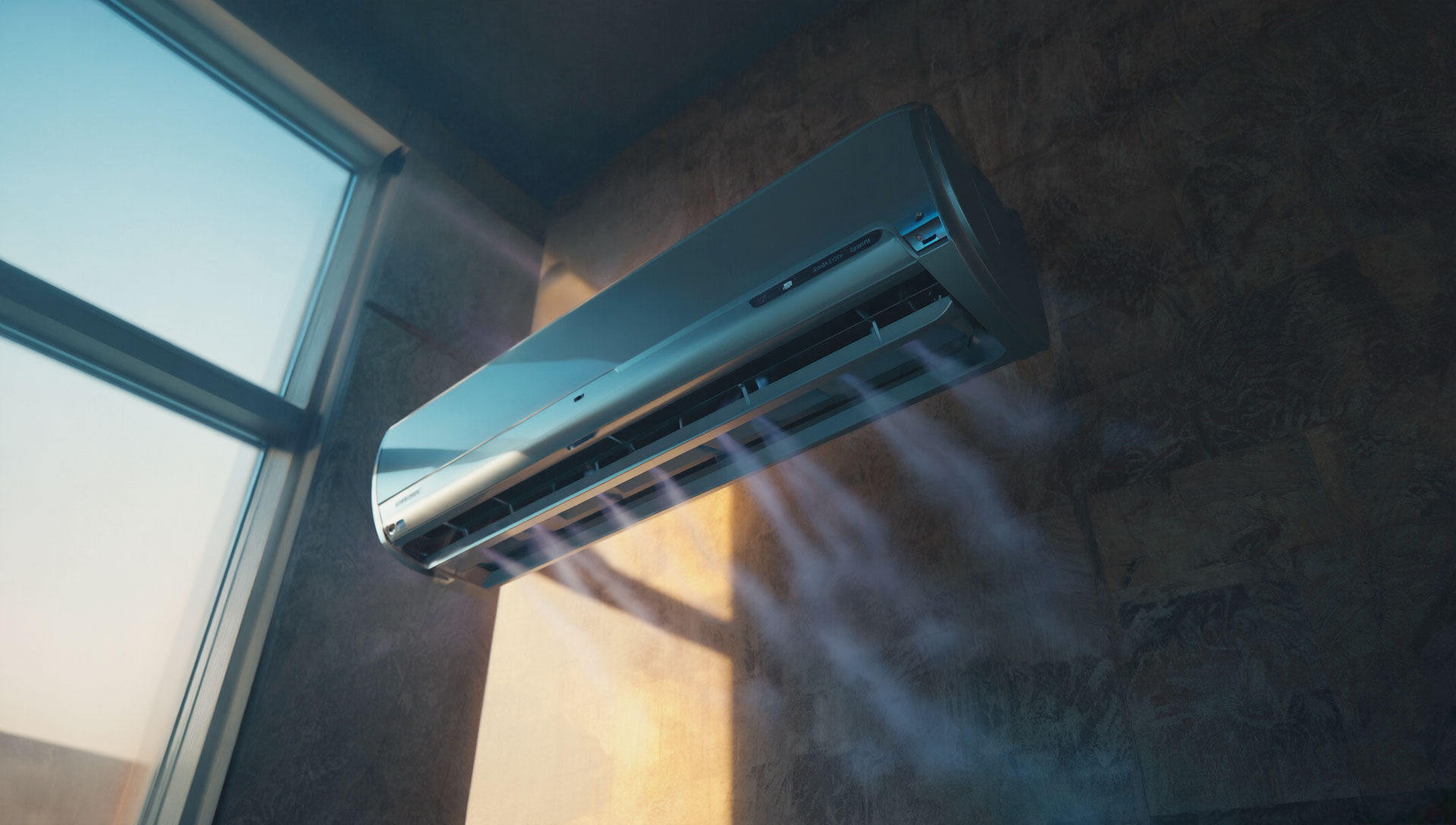The Smell of AC – So Why Does My Aircon Smell?
Table of Contents

As air conditioning becomes an increasingly common sight throughout the UK, many people experience it daily, such as during a shopping trip, whilst traveling in a vehicle, at their workplace or even within their own home. Although as you’re exposed to different types of air conditioning, you’ll quickly come to notice they can not only look very different, but they can also sound and smell different too.
Air conditioning can produce a smell when in operation, although usually it is subtle and not a cause of concern. But if you are noticing a very strong smell from your air conditioning, that’s usually a clear indicator you should arrange a visit from an AC engineer to complete maintenance or investigate for any underlying issues.
Why Does my AC Unit Smell?
As an air conditioning unit is heating or cooling the air, during that process it can have some additional effects on its surroundings and that may result in a smell being produced. The causes for this are generally linked to a lack of maintenance, with the main issue usually falling into three main categories;
Condensation build up
When cooling the air, an air conditioning system internally produces condensation as the refrigerant contained within the pipework gets cold. This causes the water in the air to condense, with water droplets forming on the evaporator coils. An air conditioner is designed to collect and divert these water droplets outside with a drain, although if that drain line is somehow blocked, damaged or obstructed, the moisture will linger and create a damp environment within the air conditioning system. This damp environment actively encourages the growth of mould and bacteria, with trapped water becoming stagnant. All of this will contribute toward the potential for unpleasant damp smells coming from your air conditioner.
Dust and organic particles
Whilst in operation, air conditioning systems internally cycle air in order to remove or provide heat energy, although whilst doing so it will naturally gather dust, pollen and other particles from the air in the process. This is not only to ensure cleanliness but also to prevent the spread of airborne contaminants. The filters in an air conditioning unit are designed to capture these airborne particles, although as a result they need to be periodically cleaned in order to remain effective. Air filters which are already full of dust and other particles will not only be unable to effectively filter the air, but the trapped particles in the filters will continue to build up too. Particularly in the case of organic particles, they can start to decay and spread a stale smell, or even a faint burning smell when the air conditioning is put into heat mode.
Electrical/Mechanical Fault
As with any electrical appliance, air conditioners are full of electrical components and due to their moving parts they are susceptible to wear and tear. Over time these internal components can weaken, particularly in the case of older air conditioning systems. This can mean components can break or overheat, which will can result in acrid burning smells. Whilst wear and tear is to be expected over time, strong burning smells are far from typical and will need to be addressed as soon as they are noticed.
The Four Most Common Air Conditioning Smells
An air conditioning system will naturally accumulate water and airborne particles such as dust, mould spores and bacteria whilst in operation. But whilst a well-maintained system will filter and drain these effectively, when that isn’t the case they can produce a range of different AC smells; although there can be other causes too.
The four most common smells that can come from an air conditioner include;
Damp/Mouldy
The most common air conditioning smell that you may notice is the scent of damp, much like the smell of wet clothes. This is usually directly due to a lack of maintenance and caused by multiple cleanliness-related issues. This may be as simple as the air filters not being regularly or properly cleaned or even a clogged condensate line resulting in trapped moisture. In both scenarios this will not only promote the growth of mould and mildew as moisture gathers in the AC system, the spores the mould creates can also exacerbate respiratory issues too.
Burning/ Musty
Occasionally, an air conditioner may produce a smell much like singed hair or that is stale/earthy. If the smell fades within a few minutes, especially if you have set your air conditioning to heat mode for the first time in winter, this isn’t a cause for alarm. In this case it is usually caused by dust and organic particles that have settled on the evaporator coils of the AC system whilst it has not been in use. Combined with any residual moisture and heat being produced by the air conditioner, this dust and moisture can temporarily create this smell. But it is important to note that if this smell is very potent and does not fade, it could indicate a mechanical or electrical issue that should not be ignored.
Plastic/Ammonia
If your air conditioner is producing a strong plastic smell that could almost be described as fishy, this can indicate a serious electrical issue that should be attended by an AC engineer as soon as possible. Potentially caused by faulty wiring or a damaged capacitor, an electrical fault is likely one of the most dangerous types of issue with air conditioning. This problem can not only cause fires but create further electrical issues within the building as well.
Vinegar or Sour Smell
Air conditioning can sometimes produce a sour or vinegar-like smell which can not only be pungent but quite unpleasant too. Whilst this smell is less common it usually indicates a bacterial build up in the system, usually as a direct result of improper or lack of maintenance. A clogged condensate line is usually the culprit, as once it becomes blocked, trapped water becomes stagnant, promoting the growth of bacteria throughout the drain line through to the evaporator coils. This issue can usually be resolved quite easily with proper maintenance by an air conditioning engineer.
Did you know?
‘Most modern air conditioning systems use R32 gas which is colourless and odourless, so if you encounter a strange smell from your AC it is unlikely to be a refrigerant leak.”
How to Prevent Air Conditioning Smells
Unpleasant odours from air conditioning systems are often linked to issues that can be prevented with annual maintenance. While basic cleaning is possible, attempting a full maintenance without proper qualifications can be dangerous and may damage your system.
During a professional air conditioning maintenance visit, a qualified MAC engineer will carry out essential checks/cleaning including:
- Inspection and chemical disinfection of the outdoor unit.
- Deodorisation and cleaning of the indoor unit evaporator coil.
- Thorough inspection for any refrigerant leaks to maintain system integrity.
- Cleaning and testing of condensate drains and pumps.
- Airflow temperature checks to assess heating and cooling performance.
- Inspection, cleaning and disinfection of fan motors, blades, and filters.
- Examination of components, connections, control circuits and sensors.
While online guides may suggest DIY maintenance, unqualified servicing can lead to damage or safety hazards. However, referring to your user manual for guidance on basic indoor unit cleaning can help keep your system in great shape between professional visits.
Contact us for More Information About the Smell of AC and Air Conditioner Maintenance
For more details on the smells produced by air conditioning or how air conditioning maintenance can prevent it, you can contact MAC today for more information! With air conditioning maintenance starting at as little as £10 a month for domestic households, keeping your air conditioning running smoothly for its maximum lifespan couldn’t be easier! MAC has years of experience installing and maintaining different air conditioning and HVAC systems with bespoke solutions for both your home and business – get in touch today to find out more at sales@midlandaircon.co.uk or call us on 0121 730 4800.
Share:
More Posts








